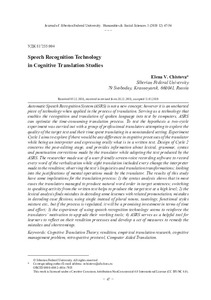Показать сокращенную информацию
Speech Recognition Technology in Cognitive Translation Studies
| Автор | Chistova, Elena V. | en |
| Автор | Чистова, Е.В. | ru_RU |
| Дата внесения | 2018-04-17T06:41:25Z | |
| Дата, когда ресурс стал доступен | 2018-04-17T06:41:25Z | |
| Дата публикации | 2018 | |
| URI (для ссылок/цитирований) | https://elib.sfu-kras.ru/handle/2311/71043 | |
| Аннотация | Automatic Speech Recognition System (ASRS) is not a new concept; however it is an uncharted piece of technology when applied in the process of translation. Serving as a technology that enables the recognition and translation of spoken language into text by computers, ASRS can optimize the time-consuming translation process. To test the hypothesis a two-cycle experiment was carried out with a group of professional translators attempting to explore the quality of the target text and their time spent translating in a nonstandard setting. Experiment Cycle 1 aims to explore if there would be any difference in cognitive processes of the translator while being an interpreter and expressing orally what is in a written text. Design of Cycle 2 concerns the post-editing stage, and provides information about lexical, grammar, syntax and punctuation corrections made by the translator while adopting the text produced by the ASRS. The researcher made use of a user-friendly screen-voice recording software to record every word of the verbalization while sight translation included every change the interpreter made to the rendition; observing the text’s linguistics and translation transformations; looking into the justifications of mental operations made by the translator. The results of this study have some implications for the translation process: 1) the syntax analysis shows that in most cases the translators managed to produce natural word order in target sentences; switching to speaking activity from the written text helps to produce the target text at a high level; 2) the lexical analysis finds mistakes in decoding some lexemes with related pronunciation, mistakes in decoding case flexions, using single instead of plural nouns, tautology, functional styles mixture etc., but if the process is regulated, it will be a promising investment in terms of time and effort;3) the experience of using speech recognition technology seems to reinforce the translators’ motivation to upgrade their working tools; 4) ASRS serves as a helpful tool for learners to reflect on their rendition processes and develop a set of measures to remedy the mistakes and shortcomings | en |
| Аннотация | Система автоматического распознавания речи (ASRS) уже не является новой технологией, однако считается перспективной в контексте переводческой деятельности. Являясь инструментом, позволяющим распознавать и декодировать разговорную речь в письменный формат, ASRS способствует оптимизации длительного процесса перевода. Для проверки гипотезы был проведен двухэтапный эксперимент с группой профессиональных переводчиков, во время которого проверялось качество переводного текста и потраченное на перевод в нестандартной обстановке время. Экспериментальный цикл 1 направлен на выявление особенностей когнитивных процессов переводчика, который пытается перевести и синхронно вербализовать письменный текст. Дизайн цикла 2 относится к этапу постредактирования и представляет анализ лексических, грамматических, синтаксических и пунктуационных корректировок переводчика при адаптации текста, подготовленного ASRS. Результаты этого исследования можно изложить следующим образом: 1) синтаксический анализ показывает, что в большинстве случаев переводчикам удалось создать естественный порядок слов в переводных предложениях, а переключение на устную репрезентацию письменного текста помогает избежать интерференции в переводе; 2) лексический анализ обнаруживает ошибки при декодировании некоторых лексем со схожим произношением, неправильные флексии, замену множественного числа единственным, тавтологию, смешение функциональных стилей и т.д., но если процесс усовершенствовать, то ASRS станет многообещающим ресурсом с точки зрения времени и усилий; 3) опыт использования технологии распознавания речи усиливает мотивацию переводчиков к модернизации рабочего инструментария; 4) ASRS служит полезным инструментом для саморефлексии учащихся и принятия ряда мер по устранению переводческих ошибок и неточностей | ru_RU |
| Язык | en | en |
| Издатель | Сибирский федеральный университет. Siberian Federal University | en |
| Тема | Cognitive Translation Theory | en |
| Тема | rendition | en |
| Тема | empirical translation research | en |
| Тема | cognitive management problem | en |
| Тема | retrospective protocol | en |
| Тема | Computer Aided Translation | en |
| Тема | переводоведение | ru_RU |
| Тема | когнитивная лингвистика | ru_RU |
| Тема | автоматизированный перевод | ru_RU |
| Тема | репрезентация | ru_RU |
| Тема | эмпирическое исследование перевода | ru_RU |
| Тема | проблема когнитивного управления | ru_RU |
| Тема | ретроспективный протокол | ru_RU |
| Название | Speech Recognition Technology in Cognitive Translation Studies | en |
| Альтернативное название | Технология распознавания речи в когнитивном переводоведении | ru_RU |
| Тип | Journal Article | en |
| Контакты автора | Chistova, Elena V.: Siberian Federal University 79 Svobodny, Krasnoyarsk, 660041, Russia; echistova@sfu-kras.ru | en |
| Контакты автора | Чистова, Е.В.: Сибирский федеральный университет Россия, 660041, Красноярск, пр. Свободный, 79 | ru_RU |
| Страницы | 47-54 | |
| Журнал | Журнал Сибирского федерального университета. Гуманитарные науки. Journal of Siberian Federal University. Humanities & Social Sciences;2018 | en |

